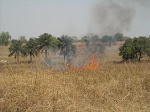In a previous post I described the inauguration in my village of Care Groups, a project designed to train local women as peer educators of simple preventative health messages.
Let me bring you up to speed.
Since then the three Care Groups I work with have had six monthly meetings covering topics such as handwashing, breastfeeding, and nutrition. Adjara my workpartner (an aid at the Health Center) and I try hard to make these meetings as interactive and fun as possible for the women with pictures, puzzles, songs, and more. Between meetings the women are supposed to make home visits so that they can then in turn teach what they learned to other families and in so doing reach a much wider audience in a faster and more effective manner. Last week I met with one of these groups:
Early last Friday morning Adjara and I arrived at our meeting place under a mango tree and waited for the women to come. One by one they assembled, some carrying stools and others benches for sitting, all sporting their matching t-shirts proclaiming them to be "Leader Mothers." Once everyone was there I formally greeted the group and asked about the previous month's home visits. I also asked about certain "critical information" such as new births, deaths, sicknesses, etc., in order to pinpoint problem areas as well as to simply gather community data.
After this Adjara and I discussed with the women our findings from a census we conducted a few months back. For the census we asked a sampling of households about hygiene and sanitation, mosquitoe net usage, breastfeeding, and more general statisitics like the number of children, up-to-date vaccinations, and pregnancies per woman. In order to present this information to the women we decided to draw pictures to represent each number and put tally marks next to it. So, for example, we had a drawing of a sick man with nineteen tally marks, that meant that nineteen illnesses were reported to us when we conducted the census. Once every picture was explained in this manner I asked the women to tell me first what was positive and then what they wanted to see change in their community. In that way they were able to set goals for themselves for the coming six months, goals we will be able to evaluate once we conduct the exact same census in August.
We then reviewed malaria--where does it come from, how can you prevent it, and how do you treat it. Since right now is the halfway point of the project we've started to go back over everything we've already covered to really make sure the women know their stuff. And they did: we quizzed them individually and at random and they all passed with flying colors, topping it all off by singing a song about malaria in Lokpa.
What is so great yet frustrating about this project is its decentralization--we try very hard to put as much power in the women's hands as possible, with varying degrees of success. For the group I've just described this has meant a wonderful show of initiative and motivation to the point where group members keep track of meeting dates, work in pairs, and form a cabinet to help with the overall organization of the group. For the other groups this hasn't always been the case. One in particular has consistently struggled with meeting times (members are almost always more than three hours late), meeting dates (we've had to reschedule three meetings), and attendance in general (twice more than half the group never even showed up).
To adress these problems Adjara and I called a village-wide meeting where we explained the goal of the project and the difficulties we've been having. We didn't quite get the demographic range we were hoping for (the meeting was made up predominanty of women) and the village chief didn't show up until the end. Regardless the women recommitted themselves to the project and promised to work harder--but as their next meeting isn't until next Friday it remains to be seen what changes if any they will actually make.
Despite hiccups like this the overall project has been wonderful and the women seem really motivated to help change their communities. I'm worried about the future and whether or not Care Groups will continue after I leave in September but even before that day comes we all still have a lot of work ahead us. And I for one can't wait to see what these women will do.
4 years ago
